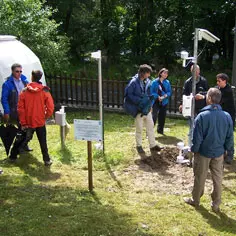
Environment and Biodiversity
Project leader
Créa (Research Center on altitude ecosystems)
Place
Alps range, France
Sponsor
Sabine Quard
Grant(s)
30 000 € to the Selection Committee at 2007/04/03
"Créa's determination to become the reference organization in scientific information on climate change in the Alps and its implications for the fauna and flora, gives this program a scientific solidarity enjoying broad public support. It combines scientific rigor with the development of an education and familiarization program aimed at the future environmental players."
Sabine Quard
In the Alps, over the last 45 years, the temperatures have increased more than in France as a whole. Faced with this warming, many questions arise concerning the ecosystems. How do they react and adapt? Seeking answers to this question, the Crea research center has been coordinating the Phénoclim project for the last two years, and invites the inhabitants to measure the impact of climate change on the vegetation.
This scientific and participative program, unique in a mountain environment, is based on gathering biological and climatic data. It involves tracking the phenology (study of the influence of climates on seasonal biological phenomena) and relies on a network of observers spread all over the alpine range, between 2000 and 2200 meters altitude, covering 70 zones divided among six French administrative districts and the Swiss canton of the Valais. Besides, some forty automatic stations have been installed in the monitored zones. They are used to measure the temperature variations as a function of local conditions (altitude, slope, geographic situation) and continuously record the air and ground temperatures.
A scientific and pedagogical program
A lot more than a scientific program, Phénoclim is also a pedagogical tool for public familiarization and education. From the outset of the program, 3473 persons and 88 primary, junior high and high schools have already participated. The project has also demonstrated its worth to the scientific community for its relevance and its originality. The aim is to continue the experiment over a minimum of 10 years in order to extend it to other countries of the Alpine Arc, and even export it to other mountain ranges to capitalize on the experience gained. The Veolia foundation will support this ambitious program by participating financially for two years.

